“Persecution of people with albinism (sometimes abbreviated PWA) may occur for different reasons. One is based on the belief that certain body parts of albinistic people can transmit magical powers. Such superstition is present especially in some parts of the African Great Lakes region, it has been promulgated and exploited by witch doctors and others who use such body parts as ingredients in rituals, concoctions and potions with the claim that their magic will bring prosperity to the user ("muti" or medicine murder). As a result, people with albinism have been persecuted, killed and dismembered, and graves of albinos dug up and desecrated. At the same time, people with albinism have also been ostracised and even killed for exactly the opposite reason, because they are presumed to be cursed and bring bad luck. The persecutions of people with albinism take place mostly in Black African communities, especially among East Africans.
Albinism is a genetically inherited condition which is very rare and worldwide affects approximately one in twenty thousand people. Although rare in the western world, albinism is quite common in sub-Saharan Africa, likely as a result of consanguinity." Both parents who may or may not be albinos themselves must carry the gene if it is to be passed on to the child and is common both in male and female and is not specific to any race or ethnic group. Statistics prove that fifty percent of albinos in Tanzania have an albino relative which they know of although very few understand or are educated about the medical and genetic causes of this condition. Most people believe it is a punishment from God or bad luck and that their "disease" could be contagious which is often the view of even members of the medical and professional community. These misconceptions, coupled with the lack of education are some of the key reasons that albinism is so heavily persecuted. This lack of knowledge about people with albinism means that myth and superstition in the name of witchcraft take place of medical and scientific facts in the minds of many albinos and native Africans which in turn has major effects the social integration of albinos into society”. – Wikipedia
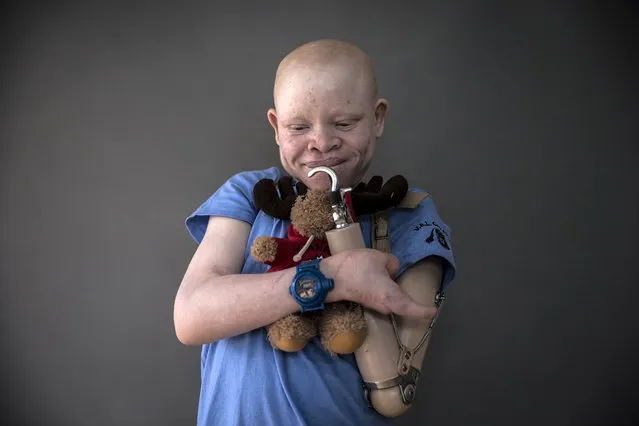
13-year-old Emmanuel Festo from Tanzania poses for a portrait with a plush toy that he says makes him feel safe at night and that he sleeps with, in New York's Staten Island, September 21, 2015. Albino body parts are highly valued in witchcraft and can fetch a high price. Superstition leads many to believe albino children are ghosts who bring bad luck. Some believe the limbs are more potent if the victims scream during amputation, according to a 2013 United Nations report. (Photo by Carlo Allegri/Reuters)
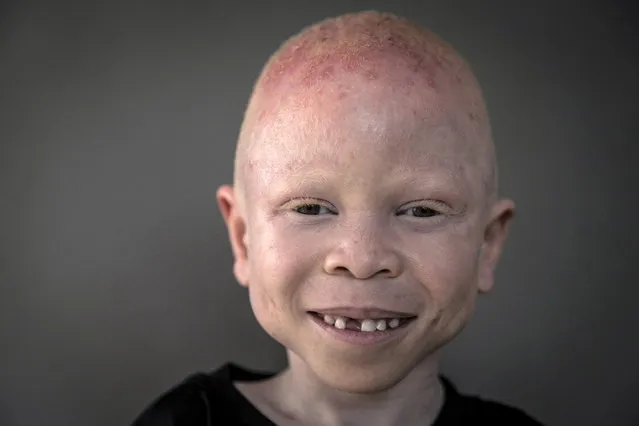
5-year-old Baraka Cosmas from Tanzania poses for a portrait in Staten Island. (Photo by Carlo Allegri/Reuters)
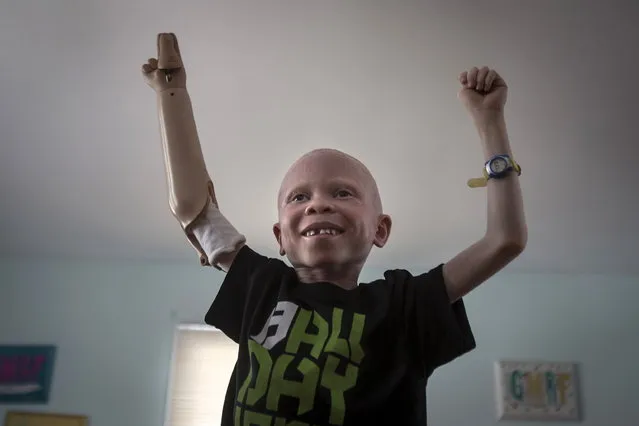
5-year-old Baraka Cosmas from Tanzania dances along as a video plays on a computer in Staten Island. (Photo by Carlo Allegri/Reuters)
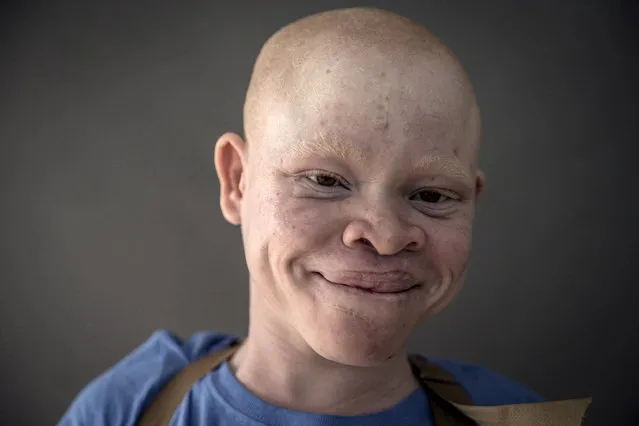
13-year-old Emmanuel Festo from Tanzania poses for a portrait in Staten Island. (Photo by Carlo Allegri/Reuters)
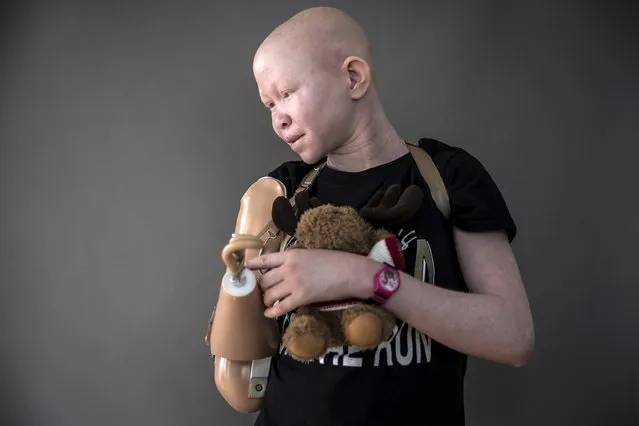
15-year-old Pendo Sengerema from Tanzania poses for a portrait with a stuffed animal she says she sleeps with at night to make her feel safe. (Photo by Carlo Allegri/Reuters)
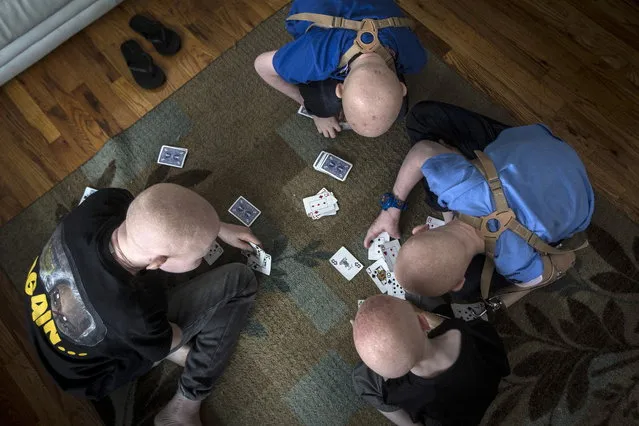
Children from Tanzania play cards in the living room in Staten Island. (Photo by Carlo Allegri/Reuters)
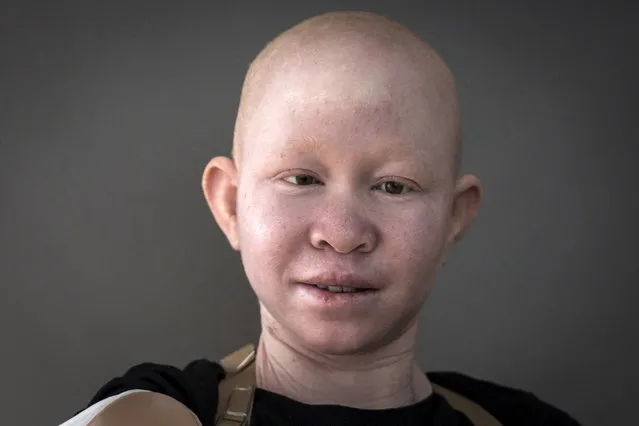
15-year-old Pendo Sengerema from Tanzania poses for a portrait in Staten Island. (Photo by Carlo Allegri/Reuters)
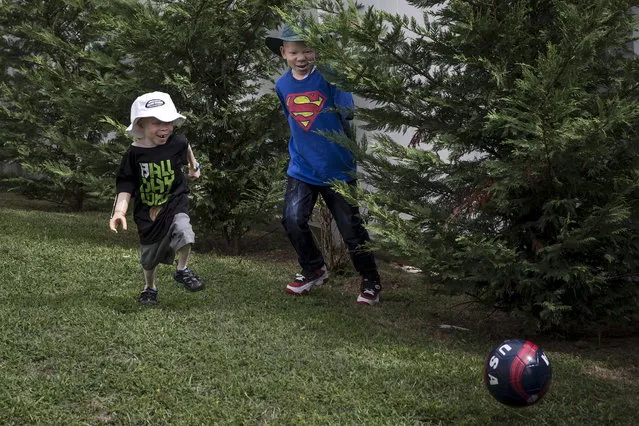
5-year old Baraka Cosmas (L) and 12-year-old Mwigulu Matonage from Tanzania play soccer in the backyard. (Photo by Carlo Allegri/Reuters)
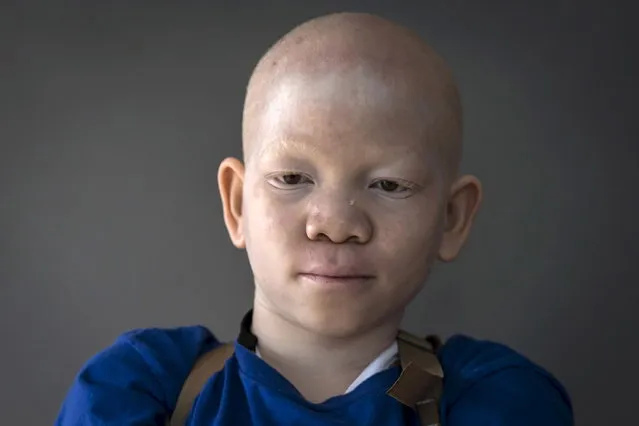
12-year-old Mwigulu Matonage from Tanzania poses for a portrait in Staten Island. (Photo by Carlo Allegri/Reuters)
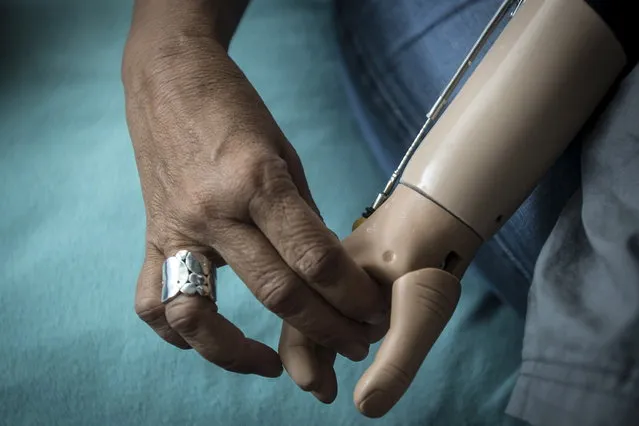
5-year-old Baraka Cosmas (R) from Tanzania holds hands with Elissa Montanati of the Global Medical Relief Fund in Staten Island. (Photo by Carlo Allegri/Reuters)
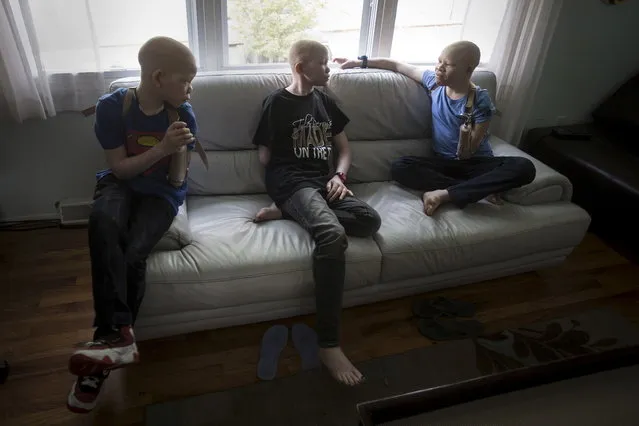
Mwigulu Matonage (L), Pendo Sengerema (C) and Emmanuel Festo (R) sit on a sofa. (Photo by Carlo Allegri/Reuters)
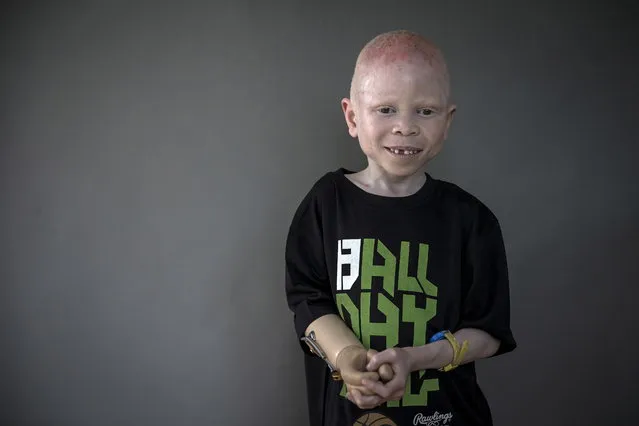
5-year-old Baraka Cosmas from Tanzania poses for a portrait. (Photo by Carlo Allegri/Reuters)
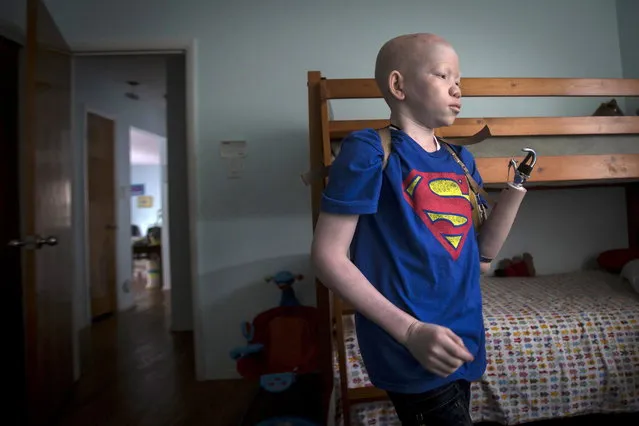
12-year-old Mwigulu Matonage from Tanzania walks into his bedroom. (Photo by Carlo Allegri/Reuters)
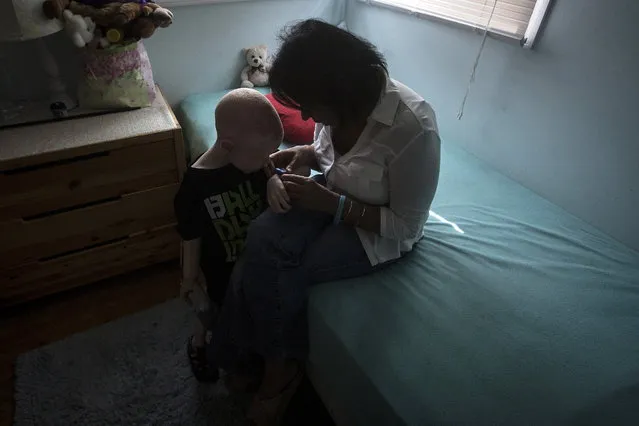
5-year-old Baraka Cosmas from Tanzania talks with Elissa Montanati of the Global Medical Relief Fund in his bedroom. (Photo by Carlo Allegri/Reuters)
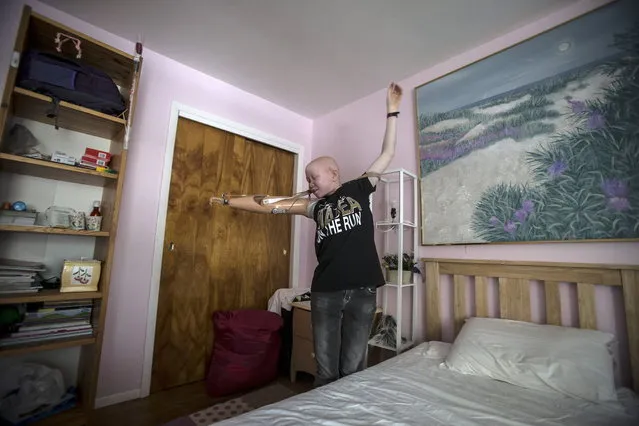
15-year-old Pendo Sengerema from Tanzania puts on her prosthetic arm in her bedroom. (Photo by Carlo Allegri/Reuters)
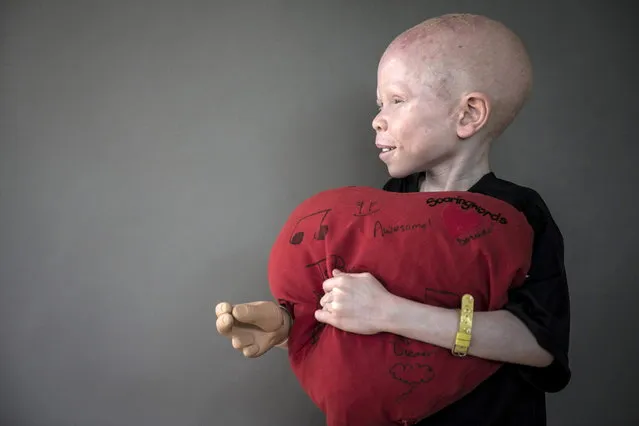
5-year-old Baraka Cosmas from Tanzania poses for a portrait with a plush heart that he says makes him feel safe at night and that he sleeps with. (Photo by Carlo Allegri/Reuters)
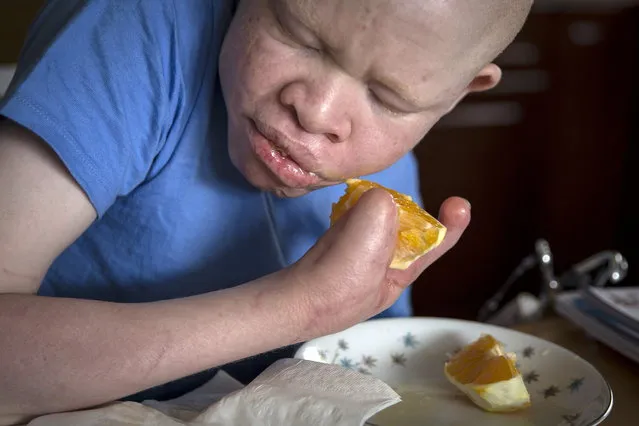
13-year-old Emmanuel Festo from Tanzania eats an orange as he does homework in Staten Island. (Photo by Carlo Allegri/Reuters)
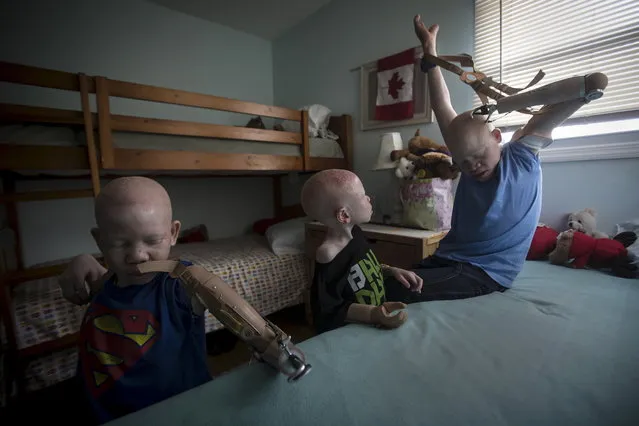
Mwigulu Matonage (L) and Emmanuel Festo (R) put on their prosthetic arms as Baraka Cosmas (C) looks on in their bedroom. (Photo by Carlo Allegri/Reuters)
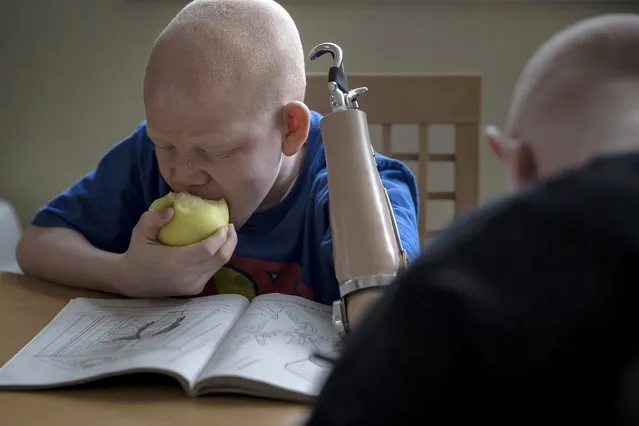
12-year-old Mwigulu Matonage from Tanzania eats an apple as he does homework. (Photo by Carlo Allegri/Reuters)
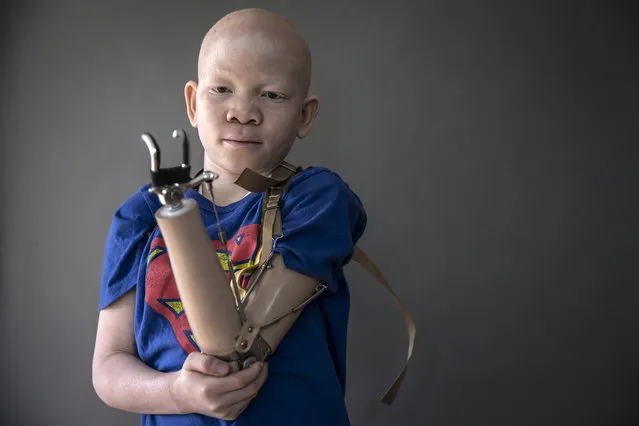
12-year-old Mwigulu Matonage from Tanzania poses for a portrait. (Photo by Carlo Allegri/Reuters)
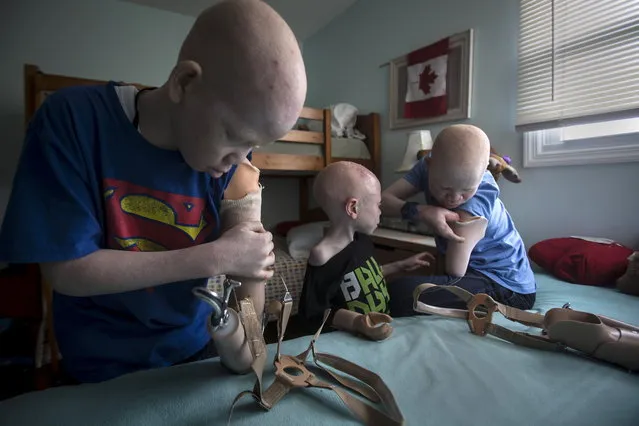
Mwigulu Matonage (L) and Emmanuel Festo (R) put on their prosthetic arms as Baraka Cosmas (C) looks on in their bedroom in Staten Island. (Photo by Carlo Allegri/Reuters)
Albinism is a genetically inherited condition which is very rare and worldwide affects approximately one in twenty thousand people. Although rare in the western world, albinism is quite common in sub-Saharan Africa, likely as a result of consanguinity." Both parents who may or may not be albinos themselves must carry the gene if it is to be passed on to the child and is common both in male and female and is not specific to any race or ethnic group. Statistics prove that fifty percent of albinos in Tanzania have an albino relative which they know of although very few understand or are educated about the medical and genetic causes of this condition. Most people believe it is a punishment from God or bad luck and that their "disease" could be contagious which is often the view of even members of the medical and professional community. These misconceptions, coupled with the lack of education are some of the key reasons that albinism is so heavily persecuted. This lack of knowledge about people with albinism means that myth and superstition in the name of witchcraft take place of medical and scientific facts in the minds of many albinos and native Africans which in turn has major effects the social integration of albinos into society”. – Wikipedia

13-year-old Emmanuel Festo from Tanzania poses for a portrait with a plush toy that he says makes him feel safe at night and that he sleeps with, in New York's Staten Island, September 21, 2015. Albino body parts are highly valued in witchcraft and can fetch a high price. Superstition leads many to believe albino children are ghosts who bring bad luck. Some believe the limbs are more potent if the victims scream during amputation, according to a 2013 United Nations report. (Photo by Carlo Allegri/Reuters)

5-year-old Baraka Cosmas from Tanzania poses for a portrait in Staten Island. (Photo by Carlo Allegri/Reuters)

5-year-old Baraka Cosmas from Tanzania dances along as a video plays on a computer in Staten Island. (Photo by Carlo Allegri/Reuters)

13-year-old Emmanuel Festo from Tanzania poses for a portrait in Staten Island. (Photo by Carlo Allegri/Reuters)

15-year-old Pendo Sengerema from Tanzania poses for a portrait with a stuffed animal she says she sleeps with at night to make her feel safe. (Photo by Carlo Allegri/Reuters)

Children from Tanzania play cards in the living room in Staten Island. (Photo by Carlo Allegri/Reuters)

15-year-old Pendo Sengerema from Tanzania poses for a portrait in Staten Island. (Photo by Carlo Allegri/Reuters)

5-year old Baraka Cosmas (L) and 12-year-old Mwigulu Matonage from Tanzania play soccer in the backyard. (Photo by Carlo Allegri/Reuters)

12-year-old Mwigulu Matonage from Tanzania poses for a portrait in Staten Island. (Photo by Carlo Allegri/Reuters)

5-year-old Baraka Cosmas (R) from Tanzania holds hands with Elissa Montanati of the Global Medical Relief Fund in Staten Island. (Photo by Carlo Allegri/Reuters)

Mwigulu Matonage (L), Pendo Sengerema (C) and Emmanuel Festo (R) sit on a sofa. (Photo by Carlo Allegri/Reuters)

5-year-old Baraka Cosmas from Tanzania poses for a portrait. (Photo by Carlo Allegri/Reuters)

12-year-old Mwigulu Matonage from Tanzania walks into his bedroom. (Photo by Carlo Allegri/Reuters)

5-year-old Baraka Cosmas from Tanzania talks with Elissa Montanati of the Global Medical Relief Fund in his bedroom. (Photo by Carlo Allegri/Reuters)

15-year-old Pendo Sengerema from Tanzania puts on her prosthetic arm in her bedroom. (Photo by Carlo Allegri/Reuters)

5-year-old Baraka Cosmas from Tanzania poses for a portrait with a plush heart that he says makes him feel safe at night and that he sleeps with. (Photo by Carlo Allegri/Reuters)

13-year-old Emmanuel Festo from Tanzania eats an orange as he does homework in Staten Island. (Photo by Carlo Allegri/Reuters)

Mwigulu Matonage (L) and Emmanuel Festo (R) put on their prosthetic arms as Baraka Cosmas (C) looks on in their bedroom. (Photo by Carlo Allegri/Reuters)

12-year-old Mwigulu Matonage from Tanzania eats an apple as he does homework. (Photo by Carlo Allegri/Reuters)

12-year-old Mwigulu Matonage from Tanzania poses for a portrait. (Photo by Carlo Allegri/Reuters)

Mwigulu Matonage (L) and Emmanuel Festo (R) put on their prosthetic arms as Baraka Cosmas (C) looks on in their bedroom in Staten Island. (Photo by Carlo Allegri/Reuters)
03 Oct 2015 08:04:00,
post received
0 comments
